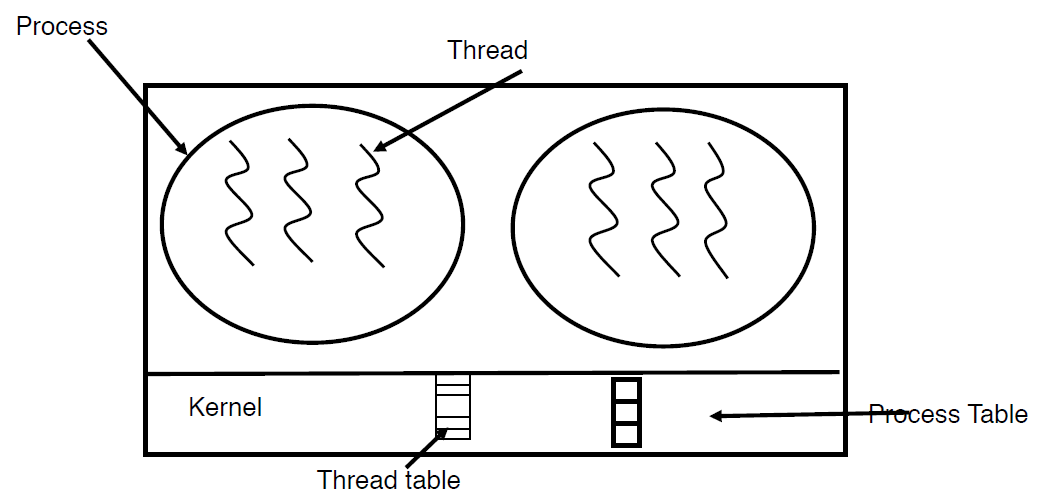- Idea: allow multiple thread of execution within the same process environment, to a large degree independent of each other.
- Multiple threads running in parallel in one process is analogous to having multiple processes running in parallel in one computer.
- Multiple threads within a process will share
- the address space
- open files
- other resources
- Potential for efficient and close cooperation
2. Multithreading
- when a multithread process is run on a single CPU system, the threads take turns running
- All threads in the process have exactly the same address space
- each thread can be in any one of the several states, just like processes
- Each thread has its own stack
3. Benefits
- Responsiveness
- multithreading an interactive application may allow a program to continue running even if part of it is blocked or performing a lengthy operation
- Resource sharing
- sharing the address space and other resources may result in high degree of cooperation
- Economy
- creating/managing processes is much more time consuming than managing threads
- Better utilization of multiprocessor architectures
4. Example: a multi-threaded web server
5. Implementing threads
- processes usually start with a single thread
- usually, library procedures are invoked to manage threads
- thread_create: typically specifies the name of the procedure for the new thread to run
- thread_exit
- thread_join: blocks the calling thread until another (specific) thread has exited
- thread_yield: voluntarily gives up the CPU to let another thread run
- threads may be implemented in the user space or in the kernel space
6. User-level thread
- user threads are supported above the kernel and are implemented by a thread library at the user level
- the library (or run-time system) provides support for thread creation, scheduling and management with no support from the kernel
- when threads are managed in user space, each process needs its own private thread table to keep track of the threads in that process
- the thread-table keeps track only of the per-thread items (program counter, stack pointer, register, state...)
- when a thread does something that may cause it to be blocked locally (e.g., wait for another thread), it calls a run time system procedure
- if the thread must be put into blocked state, the procedure performs switching
7. User-level advantage
- the operating system does not need to support multi-threading
- since the kernel is not involved, thread switching may be very fast
- each process may have its own customized thread scheduling algorithm
- thread scheduler may be implemented in the user space very efficiently
8. User-level threads: problems
- the implementation of blocking system calls is highly problematic (e.g., read from the keyboard). All the threads in the process risk being blocked
- Possible solutions
- change all system-call to non-blocking
- sometimes it may be possible to tell in advance if a call will block (e.g., select system call in some version of unix)
- jacket code round system calls
9. Kernel-level threads
- kernel threads are supported directly by the OS
- the kernel provide threat creation, scheduling and management in the kernel space
- the kernel has a thread table that keeps track of all threads in the system
- all calls that might block a thread are implemented as system call (at greater cost)
- when a thread blocks, the kernel may choose another thread from the same process, or a thread from a different process
10. Hybrid Implementation
- An alternative solution is to user kernel-level threads, and then multiplex user-level threads onto some or all of the kernel threads
- A kernel-level thread has some set of user-level threads that take turns using it
11. Windows XP threads
- windows XP support kernel-level threads
- the primary data structures of a thread are
- ETHREAD (executive thread blocks)
- thread start address
- pointer to parent process
- pointer to corresponding KTHREAD
- KTHREAD (kernel thread block)
- scheduling and synchronizing information
- kernel stack (used when the thread is running in kernel mode)
- pointer to TEB
- TEB (thread environment block)
- thread identifier
- user-mode stack
- thread-local storage
12. Linux Threads
- In addition to fork() system call, Linux provides the clone() system call, which may be used to create threads
- Linux users the term task (rather than process or thread) when referring to a flow of control
- A set of flags, passed as arguments to the clone() system call determine how much sharing is involved (e.g., open files, memory space, etc).






No comments:
Post a Comment